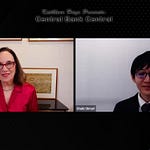Esther George sat down with me as the Shadow Open Market Committee’s 50th anniversary was commemorated at the Hoover Institution at Stanford University to discuss the gamut of policy issues. Who better to do this than someone one who started her career at the Federal Reserve Bank of Kansas City in 2001 in bank supervision, and rose to become the its president in 2011? And made a prescient dissent in June of 2022 when the Fed was getting ready to rev up its policy tightening with an historic 75bps rate hike.
As for September of 24, the Fed made a 50ps rate cut in September which was double what most economists had expected even after some officials opened the door to it. I asked Esther the more aggressive rate cut was a mistake now that concerns about a weakening labor market that drove the move have eased.
”I don't think you can say it's a mistake yet…all of these things play out over time. And so I think what will be important is the messaging about inflation that remains above target. The economy is doing well. Financial conditions are easing and that combination would suggest you have to keep an eye on how the economy is unfolding.
”Some of these dynamics could encourage a rebound in inflation which they absolutely, I think, do not want, and cannot afford to undertake. And so what happens from here on out, I think we'll judge whether 50 was a good decision this time.”
The role and importance of FOMC meeting policy dissents is also on the Fed’s front burner after Michelle Bowman became the first Fed Board governor in 20 years to make one, arguing against the 50bps cut in favor of a 25bps reduction.
Esther knows a lot about policy dissents after having made several during her 12 years as the helm of the Kansas City Fed. One of her most notable was her dissent against the high-powered 75bps rate hike the did in June of 2022. She made it clear that while she was fully in favor getting inflation back to the Fed’s 2% target, she was concerned about the uncertainty and potential instability it could create. Nine months later when Silicon Valley Bank collapsed, many say her concern was vindicated.
Her view on the value of dissents, the role they play in coming to the best policy decisions?
”These are issues that many times in the moment you don't have right and wrong answers, you are trying to drive to a consensus. But you are really, it is your duty to the public, as I saw it, to bring forward independent views.
“I will just say my experience in that committee was there was rigorous discussion. There is opportunity to disagree when you get to the point of voting, though. Having said your piece in the meeting, is it important to dissent or not?
”And again, I think, in a democracy the accountability of a committee like that really come through in how votes are cast, (that) the public can see. I see the expression of whatever the debate was coming forward, and still a group that can arrive at consensus. So I do think it's important. It is not to create havoc in the committee that wouldn't be productive, of course, but to make sure that those different voices are being expressed.”
Esther also weighed in on “the big impact on monetary policy and certainly in the world of monetary economics” as the SOMC celebrates its 50th anniversary.
”A number of these individuals have made important contributions individually but also as a group. They aren't part of a think tank. They are really a volunteer army, if you will…very credible voices in terms of thinking about what produces good outcomes for the nation that come out of this monetary policy making. And so I think they've been voices that not only important to listen to, but they've had an impact on (the question of) are we thinking about some of these issues in the right way?”
Now sit back and here, see all of this and and a whole lot more from Esther George. And when you finish if want to hear more from her “about the Federal Reserve from the perspective of a career central banker in the nation’s heartland,” here’s the link to the speech made as she the Kansas City Fed in January of last year:
https://www.kansascityfed.org/Speeches/documents/9332/2023-George-Exchequer-01-18.pdf
Esther L. George was president and chief executive officer of the Federal Reserve Bank of Kansas City from October 11, 2011 to January 31, 2023.
George joined the Kansas City Fed in 1982 and was appointed to the official staff in 1995. She has held various leadership positions with the Bank, including in the Bank’s research support functions, Public Affairs and Human Resources.
Before being appointed president on October 1, 2011, George had been the Kansas City Fed’s first vice president and chief operating officer since August 2009, where she was responsible for directing the Bank's operations throughout the Tenth Federal Reserve District. Additionally, she has served as the acting director of the Federal Reserve's Division of Banking Supervision and Regulation at the Board of Governors of the Federal Reserve System in Washington, DC.
In January 2009, George was named executive vice president in charge of the Kansas City Fed’s Division of Supervision and Risk Management, a division she led as senior vice president since 2001. In that position, she was responsible for the supervision and regulation of the Tenth District's 170 state-chartered member banks and nearly 1,000 bank and financial holding companies, as well as the Bank's discount window and risk management functions. During her tenure in banking supervision, she was directly involved in the banking supervision and discount window lending activities during the banking crisis of the 1980s and post-9/11. She is a former chair of the Federal Reserve System's Community Banking Organizations Management Group.
Beyond the Tenth Federal Reserve District, George’s experience in international central banking issues includes involvement with the Bank for International Settlement’s Financial Stability Institute programs in Lima, Peru, and Abu Dhabi, United Arab Emirates. She has also served as the Tenth District’s lead officer for international partnership programs involving the central banks of Morocco and Iraq. Additionally, she hoste the Kansas City Fed’s annual economic policy symposium in Jackson Hole, Wyoming, that is attended by central bankers from around the globe.
George retired in January 2023 after reaching the mandatory retirement age for Reserve Bank presidents.













Share this post